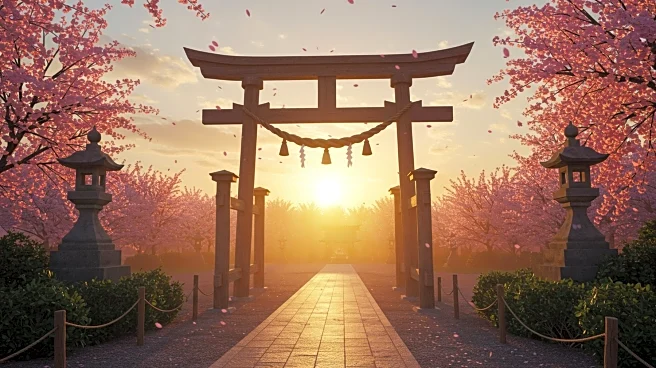What's Happening?
Japan marked the 80th anniversary of its World War II surrender with a national ceremony at Tokyo's Budokan hall, attended by approximately 4,500 officials and bereaved families. Prime Minister Shigeru Ishiba expressed remorse over the war, restoring the term in a leader's address for the first time since 2013. Emperor Naruhito emphasized the importance of remembering the war's tragic history and pledged to pass down lessons to future generations. The ceremony included a moment of silence and offerings of chrysanthemum flowers for the war dead. Meanwhile, visits to the controversial Yasukuni Shrine by right-wing politicians sparked criticism from neighboring countries, as the shrine honors Japan's war dead, including convicted war criminals.
Why It's Important?
The commemoration highlights Japan's ongoing struggle with its wartime legacy and the importance of historical memory in shaping national identity. The event underscores Japan's commitment to peace and reconciliation, particularly in the Indo-Pacific region. However, visits to Yasukuni Shrine by political figures continue to stir controversy, reflecting tensions with countries affected by Japan's wartime actions. The ceremony serves as a reminder of the need for Japan to address historical revisionism and ensure that future generations understand the complexities of its past. The emphasis on peace and remembrance is crucial in a global context marked by rising geopolitical tensions.
What's Next?
Japan faces the challenge of passing on wartime history to younger generations amid declining populations of those who experienced the war firsthand. The government may need to address revisionist narratives and ensure accurate historical education. Political leaders might continue to navigate the delicate balance between honoring war dead and acknowledging past aggressions. The anniversary could prompt discussions on Japan's role in regional peace efforts and its relationship with neighboring countries. Future commemorations may focus on fostering international cooperation and understanding, as Japan seeks to uphold its pacifist principles.
Beyond the Headlines
The event raises questions about Japan's national identity and the role of historical memory in shaping societal values. The controversy surrounding Yasukuni Shrine visits highlights the ethical and diplomatic challenges Japan faces in reconciling its past. The ceremony's emphasis on peace and remembrance may influence Japan's foreign policy and its approach to regional security. As Japan grapples with historical revisionism, the anniversary serves as a call to reflect on the lessons of war and the importance of maintaining peace in a rapidly changing world.










